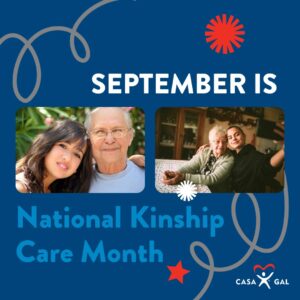September 26, 2024
Kinship care keeps children and youth connected
 Kinship care is a type of foster care that places children and youth with relatives or close family friends when they cannot remain with their parent(s). The National CASA/GAL Association for Children emphasizes the profound importance of kinship care, particularly during September, which is observed as National Kinship Care Month.
Kinship care is a type of foster care that places children and youth with relatives or close family friends when they cannot remain with their parent(s). The National CASA/GAL Association for Children emphasizes the profound importance of kinship care, particularly during September, which is observed as National Kinship Care Month.
Over 2.4 million children in the United States are being raised in kinship care arrangements. This significant number highlights the critical role that kinship caregivers play in the child welfare system. These caregivers step up to provide a safe and nurturing home, often with little preparation or support, demonstrating remarkable resilience and dedication.
At The National Convening on Kinship Care in March 2024, child welfare stakeholders and lived-experience experts discussed a future of prioritizing kinship care and the 2023 rule on Separate Licensing Standards for Relative or Kinship Foster Family Homes. These new regulations offer the same assistance to kinship caregivers as foster caregivers and allow for simpler licensing or approval standards for kinship care homes.
Research indicates that children in kinship care tend to have better outcomes compared to those in non-kinship foster placements. They are more likely to adjust well to their new environment, exhibit fewer behavioral problems, and experience greater placement stability. This stability is vital for their development, as frequent moves can disrupt their education and emotional health.
Court Appointed Special Advocate (CASA)/Guardian ad Litem (GAL) best-interest advocacy is driven by the guiding principle that children grow and develop best with their family of origin, if that can be safely achieved. Kinship care offers numerous benefits for children and youth who have experienced the trauma of being separated from their parents. One of the key advantages of kinship care is the preservation of family connections. Maintaining relationships with family members helps children retain their cultural heritage and family and community ties, which are important for their identity and emotional well-being. This continuity can significantly ease the transition into foster care, reducing the feelings of loss and disorientation that often accompany such a move.
CASA/GAL volunteers work to support kinship care arrangements by identifying and advocating for services that help stabilize these placements. This advocacy includes connecting families with resources such as financial assistance, counseling, and educational support, which are essential for the well-being of both the children and their caregivers.
The National CASA/GAL Association for Children believes in the importance of kinship care and works to support these children and families through advocacy and resources. As we celebrate National Kinship Care Month, let us honor the incredible contributions of kinship caregivers and commit to supporting them in their essential role.
Additional kinship care information:
- FACT SHEET: Biden-Harris Administration Actions to Keep Children and Families Safely Together and Supported (2024)
- Stronger Kinship Diversion Policies Are Needed to Support Children and Caregivers (2024)
- Include Kin When Designing Solutions for Children in Care (2024)
- Kinship Policy Improvements Toward Child Welfare System Transformation (2024)
- Family Ties: Analysis From a State-By-State Survey of Kinship Care Policies (2024)
- What is Kinship Care? (2023)
- A Brief But Spectacular take on prioritizing kinship care (2023)
- Kinship Care is Better for Children and Families (2017)
